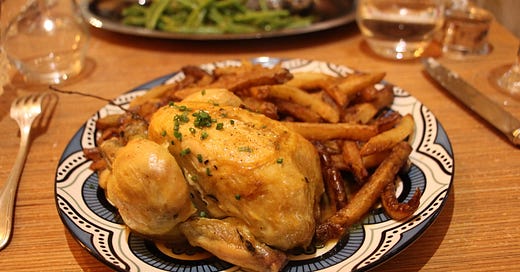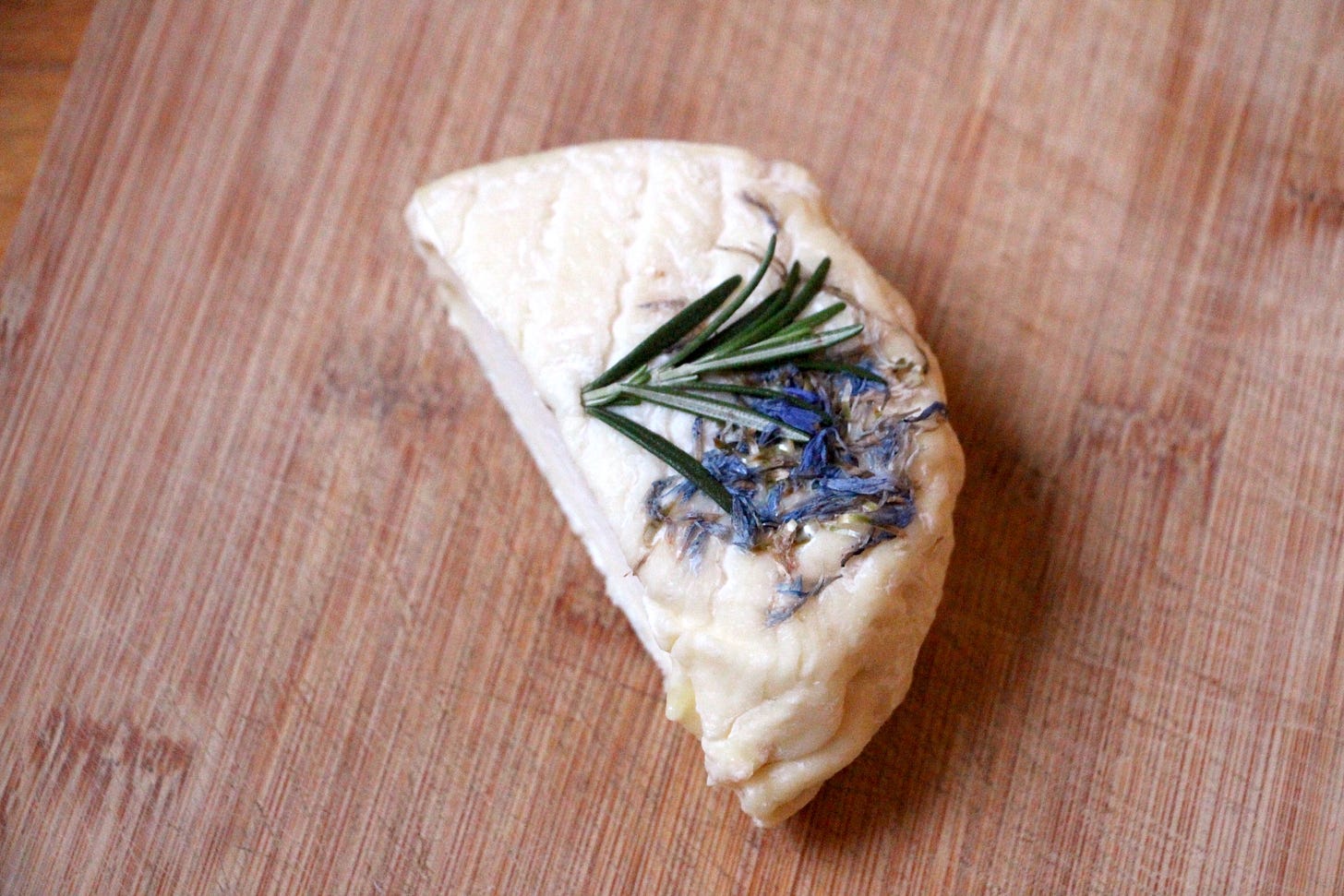Emily in France 🇫🇷 A Few Foodie Words English Desperately Needs
I wish English had a way to say saucer
If you wander around Paris these days, you’re likely to find quite a bit of English manhandled into all manner of signage. A blowout is called un brushing; a tuxedo is called un smoking. Some words – especially on-trend food words – are borrowed in situ: Street food is not dubbed cuisine de rue but la street food. Bubble tea is called not le thé à bulles but rather le bubble tea.
Borrowing isn't a one-way street when it comes to these two linked languages. English has borrowed chic and joie de vivre, etiquette and menu. But after over 18 years in France, there are a few words I find myself grasping for in my mother tongue, and given my career as a food writer and culinary tour guide, it should come perhaps as no surprise that most of them are linked to food.
I love the French verb saucer, the meaning of which speakers of Italian will recognize in the expression fare la scarpetta. It refers to the pleasure of taking a bit of bread and sopping up the last dregs of sauce – and seeing as the French are masters of sauces ranging from red wine reductions to creamy sauce au poivre, it’s always a delicious bite indeed.
Fans of buttery, creamy, chocolatey French food will perhaps be unsurprised to learn that the language has a word for dishes so rich they're almost nauseating, though écoeurant doesn't carry quite the same negative connotations as this imperfect English equivalent. The term écoeurant is built around the French word for heart – coeur –, though it has nothing to do with the attacks thereof that such dishes might incur. Rather, the French language situates nausea as living in the heart region. (French emotions live in the intestines, except for angst, which lives in the spleen. French back pain lives in the kidneys; French hangovers are said to make hair hurt.)
Something écoeurant might be a dense flourless cake oozing molten chocolate, a frangipane-stuffed, butter-rich pain au chocolat aux amandes, or a creamy gratin dauphinois. And there’s nothing odd, in France, about proclaiming such a dish écoeurant in precisely the moment one is dipping one’s spoon in for another bite.
Both this and engaging in the practice of saucer might be referred to as gourmandise, in French, a word that is frustratingly and – in my opinion – erroneously often translated as gluttony. Gourmandise in French refers to eating for reasons unrelated to physical hunger: One might opt into dessert, for example, not because one’s appetite has been sated, but rather par gourmandise, for the pure pleasure of it.
But perhaps the French food phrase I love the most is the goût de reviens-y, which is somewhat adequately parsed by the word moreish still popular among our Commonwealth friends. I nevertheless prefer the image invoked by the French: a goût de reviens-y is literally a “come back taste,” a reference to the fact that something you're eating is tasty enough – or interesting enough – to call you back for one more bite.
Cheese of the Week
Since I’m on my way home from the Basque Country as I write this missive, and spring is on the horizon, it seems doubly apt to focus on le Berrichon, a fresh sheep’s milk cheese the likes of which I’ll be sharing more and more of on my cheese tours in the coming weeks. Le Berrichon is a fresh sheep’s milk cheese made by just one producer in the Loire Valley and aged for several weeks by Virginie Boularouah, owner of two eponymous Montmartrois shops. The edible flower decoration lends a lovely nutty note to this cheese, which walks the perfect line between fudgy and fluffy.
To discover more of my favorite cheeses, be sure to follow me on Instagram @emily_in_france, subscribe to my YouTube channel, and tune into the Terroir Podcast, where Caroline Conner and I delve into France's cheese, wine, and more one region at a time.
What I’m Eating
The word bistro has come to be loosely defined, though for me, it’s simple: A bistro should be convivial, accessible without a reservation, and showcase hearty, simple food. If you take this definition, Bistro des Lettres doesn’t feel quite like a bistro, at least to me. But close your eyes, and you may change your mind. More on the blog.
Where I’m Going
1. To Le Chalet Savoyard for one more raclette before spring arrives.
2. To Les Douches la Galerie, a former public bath that has been transformed into an art gallery, to see a photo exhibit on Hervé Guibert's time in Italy.
3. To the Galerie Polka in the Marais, currently hosting an exhibit of Sebastião Salgado's iconic photos of nature.
What I'm Writing
1. Evidence has shown that farmers who use the herbicide paraquat are 2.5 times more likely to develop Parkinson’s Disease. Despite this evidence, the EPA has opted to delay a decision on its use. For Organic Authority.
2. From the archives: Le cake is a humble dish, but it may well be France's best-kept culinary secret. For Saveur.
3. From the archives: The ultimate, expert-curated guide to Italian cheeses. For Mashed.
FAQs
With the goal of bringing you the content you crave, I've solicited your help. What questions can I answer for you? Drop them into the newsletter chat, and I’ll answer as many as I can!
What I'm Reading
1. Au Revoir, Tristesse purports to be a guide to the elusive concept of French joy, which unfortunately remained elusive to me even once I’d finished it. But in sidestepping the promise, a reader can tap into the true joy of reading this book, which contains within it a bounty of phenomenally funny stories about some of France's best-loved and most-respected writers, some of which I’ll surely share in upcoming editions of this newsletter. I enjoyed reading it not just for these tidbits, but for the spoilers to some top French classics, which allowed me to craft a list of the ones I'm embarrassed I still haven't read and those I can perhaps give a miss.
2. This exploration of the ways the French ensure the continued quality of their food products, from brotherhoods to festivals to strict labeling. In the Guardian.
3. This article that even taught me a few new things about cheese! In Popular Science.
A bientôt !








